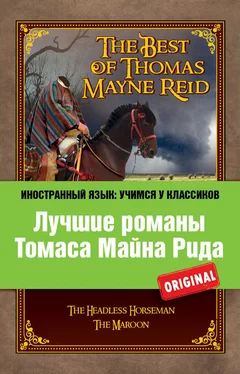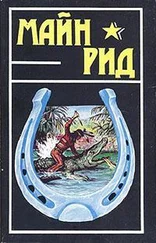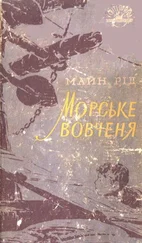The woman, thus directed, took her seat upon the bamboo couch, and remained silent and attentive – watching every movement of her hideous companion, and not without some misgivings as to the compact which was about to be entered into between them.
Chapter 22
The Love-Spell
The countenance of the myal-man had assumed an air of solemnity that betokened serious determination; and the mulatta felt a presentiment that, in return for his services, something was about to be demanded of her – something more than a payment in meat and drink.
His mysterious behaviour as he passed around the hut; now stopping before one of the grotesque objects that adorned the wall, – now fumbling among the little bags and baskets, as if in search of some particular charm – his movements made in solemn silence only broken by the melancholy sighing of the cataract without; all this was producing on the mind of the mulatta an unpleasant impression; and, despite her natural courage, sustained as it was by the burning passion that devoured her, she was fast giving way to an indefinable fear.
The priest of Obi, after appearing to have worshipped each fetish in turn, at length transferred his devotions to the rum-bottle – perhaps the most potent god in his whole Pantheon. Taking another long-protracted potation, followed by the customary “Whugh!” he restored the bottle to its place; and then, seating himself upon a huge turtle-shell, that formed part of the plenishing of his temple, he commenced giving his devotee her lesson of instructions.
“Fuss, den,” said he, “to put de lub-spell on anybody – eider a man or a woman – it am nessary, at de same time, to hab de obeah -spell go ’long wi’ it.”
“What!” exclaimed his listener, exhibiting a degree of alarm; “the obeah -spell? – on Cubina, do you mean?”
“No, not on him – dat’s not a nessary consarquence. But ’fore Cubina be made lub you, someb’dy else muss be made sick .”
“Who?” quickly inquired the mulatta, her mind at the moment reverting to one whom she might have wished to be the invalid.
“Who you tink fo’? who you greatest enemy you wish make sick?”
“Yola,” answered the woman, in a low muttered voice, and with only a moment of hesitation.
“Woan do – woman woan do – muss he man; an’ more dan dat, muss be free man. Nigga slave woan do. Obi god tell me so jess now. Buckra man, too, it muss be. If buckra man hab de obeah-’pell, Cubina he take de lub-spell ’trong – he lub you hard as a ole mule can kick.”
“Oh! if he would!” exclaimed the passionate mulatta, in an ecstasy of delightful expectation; “I shall do anything for that – anything!”
“Den you muss help put de obeah-spell on some ob de white folk. You hab buckra enemy? – Chakra hab de same.”
“Who?” inquired the woman, reflectingly.
“Who! No need tell who Chakra enemy – you enemy too. Who fooled you long time ’go? who ’bused you when you wa young gal? No need tell you dat, Cynthy Vagh’n?”
The mulatta turned her eyes upon the speaker with a significant expression. Some old memory seemed resuscitated by his words, – evidently anything but a pleasant one.
“Massa Loftus?” she said, in a half-whisper.
“Sartin shoo, Massa Loftus – dat ere buckra you enemy an’ mine boaf.”
“And you would – ?”
“Set de obeah fo’ him,” said the negro, finishing the interrogatory, which the other had hesitated to pronounce.
The woman remained without making answer, and as if buried in reflection. The expression upon her features was not one of repentance.
“Muss be him!” continued the tempter, as if to win her more completely to his dark project; “no odder do so well. Obi god say so – muss be de planter ob Moun’ Welc’m.”
“If Cubina will but love me, I care not who,” rejoined the mulatta, with an air of reckless determination.
“’Nuff sed,” resumed the myal-man. “De obeah-spell sha’ be set on de proud buckra, Loftus Vagh’n; an’ you, Cynthy, muss ’sist in de workin’ ob de charm.”
“How can I assist?” inquired the woman, in a voice whose trembling told of a slight irresolution. “How, Chakra?”
“Dat you be tole by’m-bye – not dis night. De ’pell take time. God Obi he no act all at once, not eben fo’ ole Chakra. You come ’gain when I leab de signal fo’ yon on de trumpet-tree. Till den you keep dark ’bout all dese ting. You one ob de few dat know ole Chakra still ’live. Odders know ob de ole myal-man in de mask, but berry few ebber see um face, an’ nebba suspeck who um be. Das all right. You tell who de myal-man am, den – ”
“Oh, never, Chakra,” interrupted his listener, “never!”
“No, berra not. You tell dat, Cynthy, you soon feel de obeah-spell on youseff.
“Now, gal,” continued the negro, rising from his seat, and motioning the mulatta to do the same, “time fo’ you go. I specks one odder soon: no do fo’ you to be cotch hya when dat odder come. Take you basket, an’ folla me.”
So saying, he emptied the basket of its heterogeneous contents; and, handing it to its owner, conducted her out of the hut.
Chapter 23
Chakra Redivivus
The scene that had thus transpired in the depths of the Duppy’s Hole requires some explanation. The dialogue which Cynthia had held with the hideous Coromantee, though couched in ambiguous phrase, clearly indicated an intention to assassinate the Custos Vaughan; and by a mode which these arch-conspirators figuratively – almost facetiously – termed the obeah-spell !
In the diabolical design, the woman appeared to be acting rather as coadjutor than conspirator; and her motive for taking part in the plot, though wicked enough, presents, in the language of French law, one or two “extenuating circumstances.”
A word or two of the mulatta’s history will make her motive understood, though her conversation may have already declared it with sufficient distinctness.
Cynthia was a slave on the plantation of Mount Welcome – one of the house-wenches, or domestics belonging to the mansion; and of which, in a large establishment like that of Custos Vaughan, there is usually a numerous troop.
The girl, in earlier life, had been gifted with good looks. Nor could it be said that they were yet gone; though hers was a beauty that no longer presented the charm of innocent girlhood, but rather the sensualistic attractions of a bold and abandoned woman.
Had Cynthia been other than a slave – that is, had she lived in other lands – her story might have been different. But in that, her native country – and under conditions of bondage that extended alike to body and soul – her fair looks had proved only a fatal gift.
With no motive to tread the paths of virtue – with a thousand temptations to stray from it – Cynthia, like, it is sad to think, too many of her race, had wandered into ways of wantonness. It might be, as Chakra had obscurely hinted, that the slave had been abused. Wherever lay the blame, she had, at all events, become abandoned.
Whether loving them or not, Cynthia had, in her time, been honoured with more than one admirer. But there was one on whom she had at length fixed her affections – or, more properly, her passions – to a degree of permanence that promised to end only with her life. This one was the young Maroon captain, Cubina; and although it was a love of comparatively recent origin, it had already reached the extreme of passion. So fierce and reckless had it grown, on the part of the wretched woman, that she was ready for anything that promised to procure her its requital – ready even for the nefarious purpose of Chakra.
To do Cubina justice, this love of the slave Cynthia was not reciprocated. To the levities and light speeches habitually indulged in by the Maroons, in their intercourse with the plantation people, Cubina was a singular exception; and Cynthia’s statement that he had once returned her love – somewhat doubtingly delivered – had no other foundation than her own groundless conjectures, in which the wish was father to the thought.
Читать дальше
Конец ознакомительного отрывка
Купить книгу











